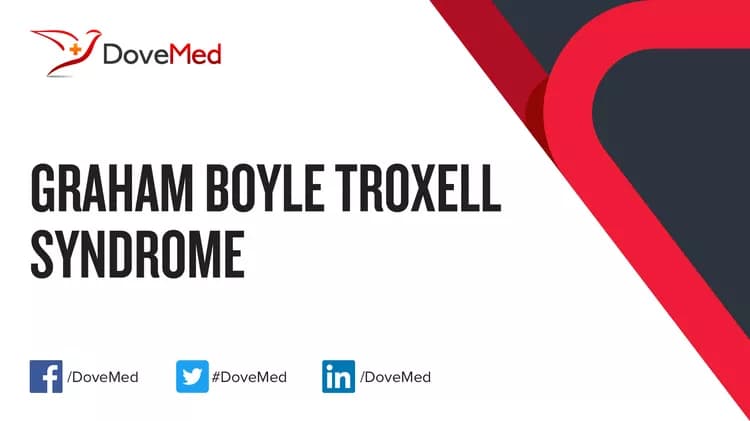What are the other Names for this Condition? (Also known as/Synonyms)
- Cystic Hamartoma of Lung and Kidney
What is Graham Boyle Troxell Syndrome? (Definition/Background Information)
- Graham Boyle Troxell Syndrome, also known as Cystic Hamartoma of Lung and Kidney, is a rare developmental malformation reported in 3 patients
- The syndrome is characterized by the presence of benign hamartomatous cysts in kidney and lung, clinically presenting as abdominal mass. Other associated features include hyperplastic nephromegaly, medullary dysplasia and mesoblastic nephroma
- There have been no further descriptions in the literature since 1987
(Source: Cystic hamartoma of lung and kidney; Orphanet, National Institute of Health and Medical Research (INSERM), Paris.)
Who gets Graham Boyle Troxell Syndrome? (Age and Sex Distribution)
- Graham Boyle Troxell Syndrome is a very rare congenital disorder, with less than 6 cases reported thus far in the medical literature
- The presentation of symptoms is known to occur soon after birth or in infancy
- Both males and females may be affected
What are the Risk Factors for Graham Boyle Troxell Syndrome? (Predisposing Factors)
- Currently, no risk factors have been clearly identified for Graham Boyle Troxell Syndrome
It is important to note that having a risk factor does not mean that one will get the condition. A risk factor increases one’s chances of getting a condition compared to an individual without the risk factors. Some risk factors are more important than others.
Also, not having a risk factor does not mean that an individual will not get the condition. It is always important to discuss the effect of risk factors with your healthcare provider.
What are the Causes of Graham Boyle Troxell Syndrome? (Etiology)
- The cause of Graham Boyle Troxell Syndrome is not known at the present time
- It has been suggested that the congenital disorder develops as a result of a “prenatal neoplastic event” during the development of the fetus, at about the 5th week of gestation
What are the Signs and Symptoms of Graham Boyle Troxell Syndrome?
The signs and symptoms of Graham Boyle Troxell Syndrome may include:
- Hypertension
- Multicystic kidney dysplasia
- Pulmonary fibrosis
- Recurrent respiratory infections
- Respiratory insufficiency
(Source: Graham Boyle Troxell Syndrome; Genetic and Rare Diseases Information Center (GARD) of National Center for Advancing Translational Sciences (NCATS), USA.)
How is Graham Boyle Troxell Syndrome Diagnosed?
Graham Boyle Troxell Syndrome is diagnosed on the basis of the following information:
- Complete physical examination
- Thorough medical history evaluation
- Assessment of signs and symptoms
- Laboratory tests
- Imaging studies
- Biopsy studies, if necessary
Many clinical conditions may have similar signs and symptoms. Your healthcare provider may perform additional tests to rule out other clinical conditions to arrive at a definitive diagnosis.
What are the possible Complications of Graham Boyle Troxell Syndrome?
The complications of Graham Boyle Troxell Syndrome may include:
- Failure to thrive
- Severe respiratory distress
Complications may occur with or without treatment, and in some cases, due to treatment also.
How is Graham Boyle Troxell Syndrome Treated?
Graham Boyle Troxell Syndrome is an extremely rare congenital condition. The treatment is tailored toward managing the signs and symptoms and any complications that develop.
How can Graham Boyle Troxell Syndrome be Prevented?
- Currently, Graham Boyle Troxell Syndrome may not be preventable, since the cause and risk factors for this condition are not known
- Active research is currently being performed to explore the possibilities for treatment and prevention of disorders such as Graham Boyle Troxell Syndrome
- Regular medical screening at periodic intervals with tests and physical examinations are recommended
What is the Prognosis Graham Boyle Troxell Syndrome? (Outcomes/Resolutions)
- The prognosis of Graham Boyle Troxell Syndrome is dependent upon the severity of the signs and symptoms and associated complications, if any
- Individuals with mild conditions have better prognosis than those with severe symptoms and complications
- Typically, the prognosis may be assessed on a case-by-case basis
Additional and Relevant Useful Information for Graham Boyle Troxell Syndrome:
The following DoveMed website link is a useful resource for additional information:
Related Articles
Test Your Knowledge
Asked by users
Related Centers
Related Specialties
Related Physicians
Related Procedures
Related Resources
Join DoveHubs
and connect with fellow professionals


0 Comments
Please log in to post a comment.